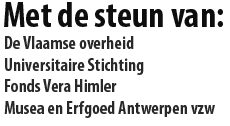B. DESEURE
Questie en Afdronk: sociale codes in het openbare lokaal op het Noord- Brabantse platteland in de nieuwe tijd
Summary: Questie en Afdronk: Social codes at the public space in the North-Brabant countryside during the New Time
Based on process files, this article gives a view on the social interaction at inns in the North-Brabant countryside. At the centre is the whole of gestures, words, movements etc. that participants used during social interaction. Due to the public nature of the inn such forms of contact got a ritual value: they were social codes. They structured the social interaction in the intense and limited space of the bar. By means of formal signals, inn visitors could rapidly make their relation and intentions towards the others present known. On the inflammable sociability of the New Time social codes were all the more necessary. A culture of male honour and competition, a certain degree of neurosis and the specific inn surroundings ensured many conflicts and abundant use of violence. However, even the many inn brawls which arose this way were ritually organized. A fixed pattern led from provocation, to fights and finally to a reconciliation drink. Thanks to this informal system of conflict control a deadly outcome (destabilizing in an already precarious pre-modern society) could be avoided as much as possible. The few times it didn’t can be considered exceptional.
,
W. BRAEKMAN
Douanier Cyriel De Vuyst, een vergeten amateur-volkskundige (1866-1951)
Summary: Customs officer Cyriel De Vuyst, a forgotten amateur-folklorist (1866-1951)
This customs officer, born at Herzele (East-Flanders), resided for his job in many parts of Belgium. In each he came into contact with the local population. He collected and published very interesting original material and is therefore to be regarded as one of the more important amateur folklorists. Together with a number of others, he paved the way for the scientific study of orally collected legends, tales, fairy tales and the like.
Some of this material he has published in periodicals such as Oosvlammse Zanten en Biekorf. The majority of his contributions, however, were published in Het Morgenrood, a little known and rare periodical in which he was a member of the editorial board. In the present paper, the undeserved neglect of De Vuyst is evidenced by a detailed bibliographical survey of his many publications of material collected from spokesmen living as far apart as Maastricht and Tourcoing.
,

